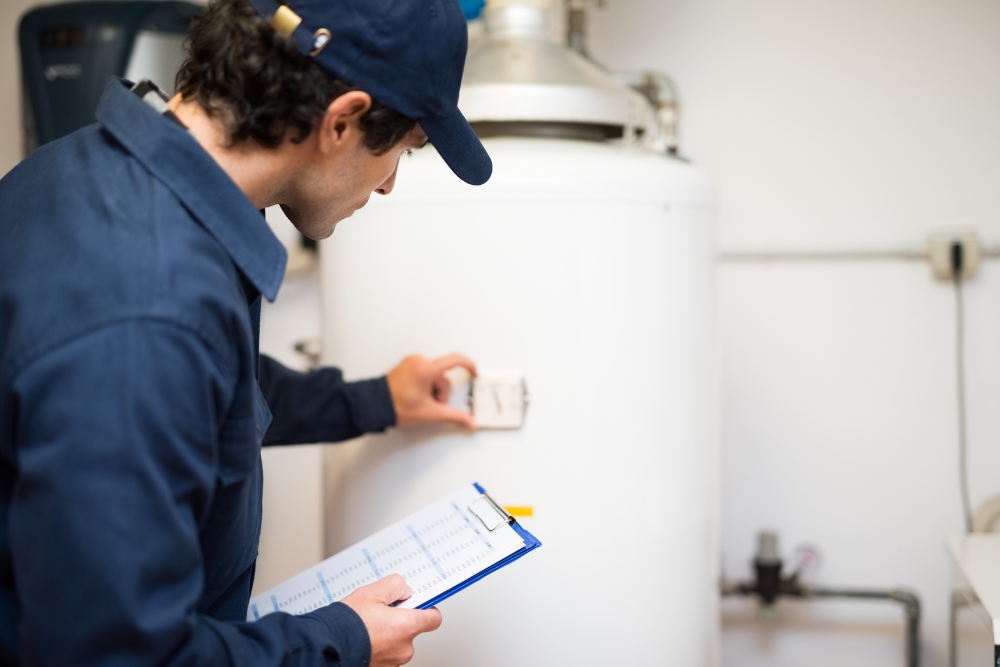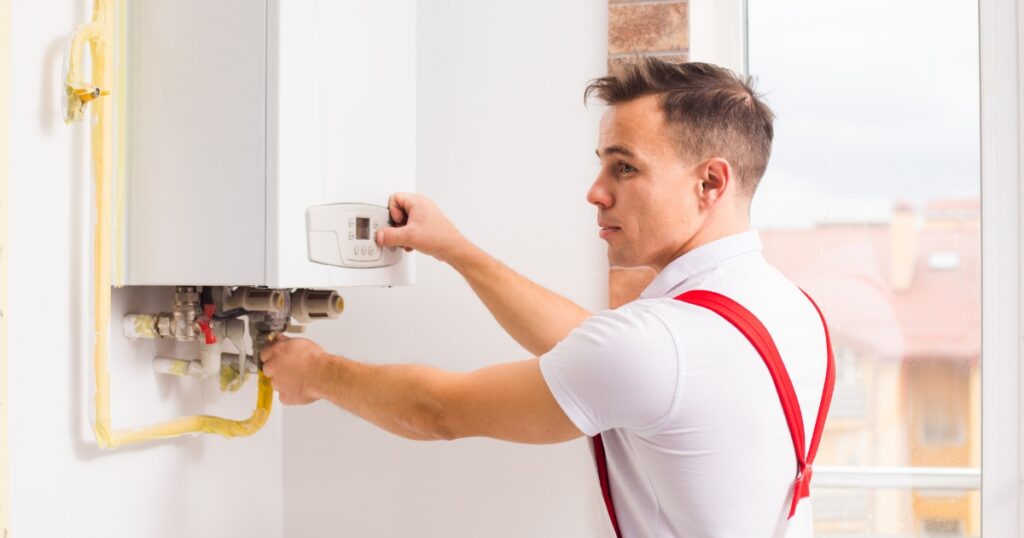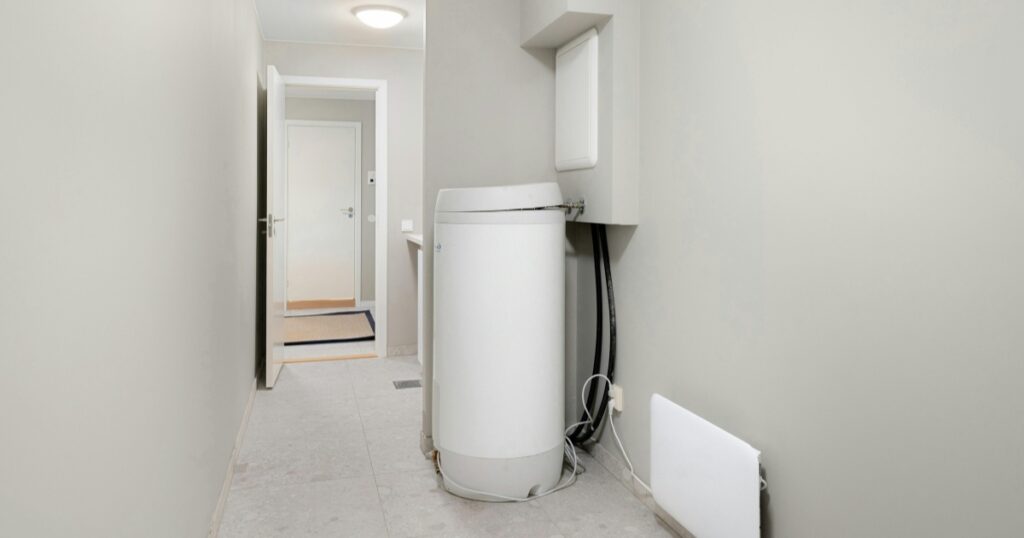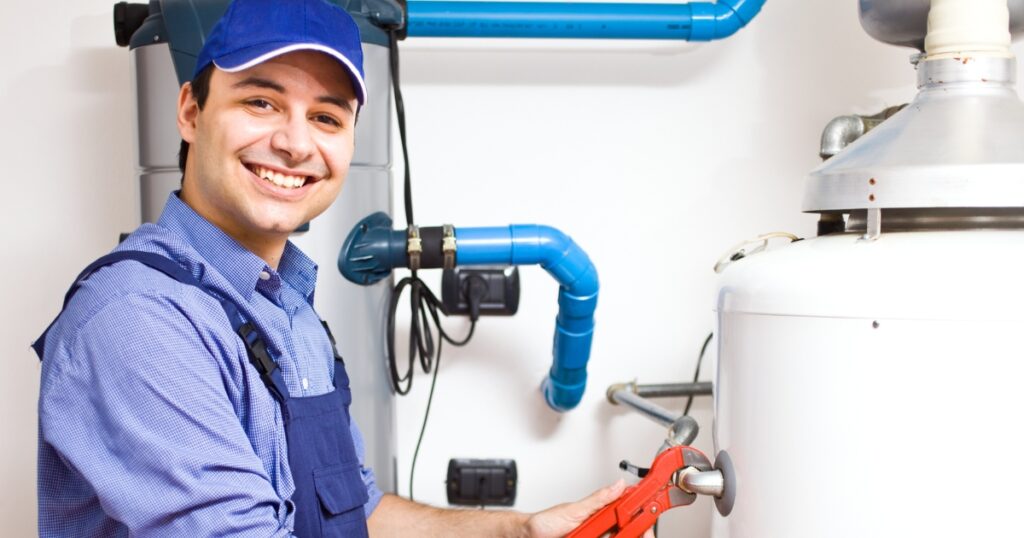Ever copped an icy blast from the shower when you’re expecting a toasty flow? It’s enough to make you wanna chuck a wobbly, right? We get the drill because we’ve had our fair share of shivery mornings, too.
Trust us, keeping your hot water system in tip-top shape is a bit like footy training – it’s all about putting in the work upfront to avoid being blindsided by a cold splash later.
Our latest yarn on the blog tackles how regular check-ins with your hot water can dodge those frosty wake-up calls and even help keep your bills from going through the roof. So grab a cuppa, settle in, and let’s chat about some ripper tips that’ll keep things steamy just how we like it!
Key Takeaways
- Regular hot water system servicing prevents nasty surprises like chilly showers and high energy bills by keeping the system efficient and reducing wear and tear.
- Professional maintenance every 2 years can extend the life of your hot water system, keep it safe from hazards like leaks or gas issues, and maintain a steady supply of clean, hot water.
- Servicing helps spot early signs of trouble such as strange noises or drips that could lead to bigger problems if ignored.
- Upgrading to a newer model may be wise based on the age of your current system, increasing energy costs, or taking advantage of new technology for better efficiency.
- Simple DIY checks between professional services can help prolong your system’s life; watch out for leaks, flush tanks periodically, and manage temperature settings wisely.
Signs That Your Hot Water System Needs Servicing
If you’ve noticed an increase in your energy bills, decreased efficiency in heating water, strange noises coming from your hot water system, or any leaks or drips, it’s a clear sign that your hot water system needs servicing. These are all indicators that something may be wrong with the system and should be addressed as soon as possible.

Increase in energy bills
We’ve all felt that sinking feeling when we open our energy bill and it’s higher than expected. Often, this can be a sign that your hot water system isn’t running as efficiently as it should be.
Regular servicing of your hot water system plays a crucial role in keeping those bills under control by ensuring the system is operating at peak efficiency. High energy consumption not only hits hard on our wallets but also suggests there might be an underlying issue such as sediment build-up or a malfunctioning component.
Let’s take charge of our household expenses by keeping our hot water systems well-maintained. We want to avoid wasted energy and ensure every cent spent towards heating our water counts, don’t we? By investing in regular upkeep, we make sure that all parts are working correctly – which translates into more efficient use of electricity or gas – ultimately leading to lower utility bills for us.
It’s a smart move for both our comfort and budget to get ahead of the game with routine maintenance rather than wait for costs to spiral out of control.
Decreased efficiency
Regular hot water system maintenance is crucial to prevent decreased efficiency in your system. Over time, sediment and mineral buildup can affect the heating elements or burners, causing your hot water system to work harder and use more energy.
By scheduling regular servicing every 2 years, you can ensure that your hot water system runs efficiently, saving you from higher energy bills and unexpected breakdowns. This proactive approach also extends the lifespan of your hot water system while maintaining a consistent supply of hot water for your household needs.
Proper maintenance not only prevents sudden inefficiencies but also contributes to long-term cost savings and improved reliability. With regular servicing, homeowners can enjoy uninterrupted access to hot water without worrying about fluctuations in performance or unexpected repairs.
Strange noises
After noticing decreased efficiency in your hot water system, another sign that it may need servicing is strange noises. Unusual sounds such as banging, popping, or rumbling coming from the unit can indicate sediment buildup or a potential problem with the heating element.
These issues can lead to reduced performance and increased energy consumption over time. Addressing these strange noises through regular professional maintenance can help prevent further damage and improve the overall efficiency of your hot water system.
Regular servicing by a licensed professional ensures that any strange noises are promptly investigated and resolved, improving the safety and reliability of your hot water system. By addressing these issues early on, you can avoid costly repairs and extend the lifespan of your hot water heater while ensuring consistent access to hot water throughout the year.
Leaks or drips
If you notice leaks or drips coming from your hot water system, it is important to address the issue promptly. Even small leaks can lead to significant water wastage and potential damage to your property.
Regular maintenance can help prevent these issues by identifying and fixing any leaks early on. It’s essential to keep an eye out for any signs of leakage in and around your hot water system as part of routine inspections.
Hiring a licensed professional for regular servicing will ensure that any leaks or drips are detected and repaired, preventing further damage and ensuring the efficiency and reliability of your hot water system.
Benefits of Regular Hot Water System Maintenance
Regular maintenance of your hot water system can lead to a longer lifespan, improved efficiency, better water quality and cost savings. Want to know more about the benefits? Keep reading!
Prolonged lifespan
Regular maintenance of your hot water system is crucial in ensuring a prolonged lifespan. By having your system regularly serviced, you can prevent unexpected breakdowns and costly repairs that could shorten its lifespan.
This proactive approach also helps to maintain the efficiency and reliability of your hot water system, providing a consistent hot water supply while lowering utility bills.
Improved safety is another key benefit of regular maintenance, as it ensures that your water heating system operates safely without any potential hazards. With the help of a licensed professional, routine servicing extends the life expectancy of your hot water system, saving you from inconveniences and expenses associated with unexpected malfunctions or replacements.
Increased efficiency
Regular hot water system maintenance increases efficiency and ensures that your system operates at its best, providing consistent, reliable hot water when you need it. This not only reduces energy consumption but also saves you money on utility bills.
By maintaining your system regularly, you can optimise its performance and prevent unexpected breakdowns. As a result, you’ll enjoy the convenience of a well-functioning hot water system while minimising the risk of costly repairs in the future.
Maintaining the efficiency of your hot water system also contributes to improved safety and extends its lifespan. With regular servicing, you can enhance the overall reliability of your hot water system and avoid inconvenience caused by inefficient or faulty operation.
Improved safety
Regular hot water system maintenance significantly improves the safety of your water heating system. This includes checking for potential leaks, ensuring proper ventilation for gas-powered systems, and inspecting electrical components to prevent any hazards.
By conducting regular servicing, you minimise the risk of accidents such as fires or carbon monoxide leaks, promoting a safe environment for your household. Professional maintenance also ensures that pressure relief valves and temperature controls are functioning correctly, preventing overheating or pressure buildup that could lead to dangerous situations.
Maintaining your hot water system not only increases its longevity and efficiency but also prioritises the safety of your home and family. With routine servicing, you can have peace of mind knowing that your hot water system is operating safely and reliably throughout the year.
Better water quality
Regular maintenance of your hot water system leads to better water quality. A well-maintained system can help prevent the buildup of sediments and corrosion, which can lead to discoloured or foul-smelling water.
By ensuring that your hot water system is clean and functioning optimally, you can enjoy cleaner and healthier water for everyday use. This also contributes to improved safety as it reduces the risk of harmful contaminants making their way into your household’s water supply.
Ensuring better water quality through regular maintenance aligns with our commitment to providing a reliable supply of safe and clean hot water for you and your family. It also supports the longevity and efficient operation of your hot water system while reducing the need for costly repairs in the future.
Cost savings
Regular hot water system maintenance brings about significant cost savings in the long run. By ensuring that your system runs efficiently, you can lower your utility bills and avoid unexpected expenses associated with repairs or breakdowns.
Through routine servicing, the water heater’s performance is optimised, leading to reduced energy consumption and thus saving on operational costs over time. Additionally, the prevention of costly repairs and replacements contributes to substantial cost savings as well.
Moreover, regular maintenance increases the lifespan of your hot water system, thereby reducing the frequency of having to invest in a new unit. This proactive approach not only saves money but also offers peace of mind knowing that your hot water supply is reliable and efficient without any sudden financial burden due to unforeseen issues.

Types of Hot Water Systems
There are different types of hot water systems including gas water heaters, electric water heaters, and tank vs tankless systems. To learn more about the benefits of regular maintenance for these systems, keep reading!
Gas Water Heaters
Regularly servicing your gas water heater is crucial for ensuring its longevity, efficiency, and safety. By having a licensed professional perform regular maintenance on your gas water heater, you can prevent unexpected breakdowns and costly repairs while also enjoying lower utility bills.
Additionally, improved safety and consistent hot water supply are among the key benefits of regular servicing. Typically, gas water heaters should be serviced every 2 years to ensure year-round reliability.
Electric Water Heaters
Electric water heaters are a common choice for many homeowners due to their affordability and efficiency. These systems use electricity to warm the water, ensuring a constant supply of hot water for your household needs.
It’s important to note that electric water heaters require regular maintenance to ensure optimal performance and longevity. By scheduling professional servicing every 2 years, you can improve the safety and efficiency of your electric water heater while also preventing unexpected breakdowns.
Professional maintenance not only extends the lifespan of your electric water heater but also helps in maximising its energy efficiency, which can lead to cost savings on utility bills over time.
Tank vs Tankless Systems
Moving on from electric water heaters, let’s weigh the pros and cons of tank vs. tankless systems. Tank water heaters store a large amount of hot water in a storage tank, ready for use at any time.
They are cost-effective to install but may lead to energy wastage as they continuously heat the stored water, even when not in use. On the other hand, tankless systems heat water on demand and do not require a storage tank, offering an endless hot water supply and higher energy efficiency. However, they often come with a higher upfront cost.
Tankless systems take up less space than traditional tanks and have a longer lifespan. Additionally, they provide consistent hot water flow rates and can be more cost-effective in the long run due to their energy efficiency. Alternatively, while tank systems may be cheaper upfront and simpler to install or repair, they tend to lose efficiency over time due to mineral build-up inside the tank.
DIY Maintenance Tips
Regular inspections and tank flushing are essential to keep your hot water system running smoothly. By keeping an eye on the temperature settings, you can ensure that your system is operating at its best efficiency.
Regular inspections
Regular inspections are crucial to the upkeep of your hot water system. Here are essential tasks to be performed during regular inspections:
- Check for any leaks or drips around the unit, as they can indicate underlying issues that need attention.
- Inspect the temperature and pressure relief valve to ensure it is functioning properly and releasing excess pressure when needed.
- Examine the heating elements and thermostats for any signs of wear or malfunction.
- Test the water temperature to ensure it is consistent and at a safe level for use.
- Clean the exterior of the unit and remove any debris that may be obstructing airflow.
Tank flushing
To keep your hot water system running efficiently, tank flushing is an essential maintenance task. Flushing the tank helps to remove sediment and mineral buildup, ensuring optimal performance and extending the lifespan of the system. Here’s why tank flushing is important:
- Improves Efficiency: Flushing the tank clears out sediment that can hinder the heating process, allowing your hot water system to work at its best.
- Prevents Corrosion: Regular tank flushing helps prevent corrosion by removing sediments that can lead to rust and deterioration of the tank lining.
- Enhances Water Quality: By eliminating accumulated debris, tank flushing improves water quality by preventing contaminants from entering your taps.
- Ensures Consistent Hot Water Supply: Flushing the tank maintains a consistent supply of hot water by preventing blockages and inefficient heating.
- Increases Lifespan: Regular flushing reduces strain on the system, increasing its longevity and reducing the likelihood of unexpected breakdowns.
Temperature settings
To maintain your hot water system, set the temperature to 120 degrees Fahrenheit to prevent scalding and growth of harmful bacteria.
- Set the temperature to 120 degrees Fahrenheit: This prevents overheating, reduces energy consumption, and minimises the risk of scalding.
- Prevent bacterial growth: Keeping the temperature at 120 degrees Fahrenheit inhibits the growth of harmful bacteria, ensuring safe water quality.
- Reduce energy consumption: Lowering the temperature setting helps in minimising energy usage, which can lead to cost savings on your utility bills.
- Minimise scalding risk: By adjusting the temperature setting, you can reduce the risk of accidental scalding from excessively hot water.
- Ensure safety and efficiency: Setting your hot water system’s temperature at 120 degrees Fahrenheit contributes to improved safety and operational efficiency.
When to Upgrade Your Hot Water System
If your hot water system is getting old and showing signs of wear, it might be time to consider upgrading to a newer, more efficient model. Increasing energy bills and advancements in technology are also good indicators that an upgrade may be necessary.
Age of the system
Regularly servicing your hot water system is essential, especially as it ages. Over time, wear and tear can take a toll on the efficiency and safety of your system. As hot water systems age, they become more prone to breakdowns and malfunctions.
Without proper maintenance, an older hot water system may also lead to increased energy bills due to decreased efficiency. By ensuring that your aging hot water system receives regular professional servicing every 2 years, you can prolong its lifespan while also maintaining reliable performance and safety.
As a homeowner, it’s important to be proactive in monitoring the age of your hot water system and scheduling regular maintenance to keep it running smoothly. Don’t wait for issues to arise – stay ahead by investing in routine upkeep for your aging water heater.
Increasing energy bills
Regular hot water system maintenance can help in avoiding a sudden surge in energy bills. By ensuring that your system is running efficiently, you can prevent unnecessary energy usage and keep your utility costs in check.
Proper maintenance also contributes to the smooth functioning of the system, which reduces its overall energy consumption.
Improved efficiency through regular servicing ensures that your hot water system operates without straining itself, resulting in lower energy consumption and subsequently reducing your monthly bills.
Technological advancements
The advancement of technology in hot water systems has led to significant improvements in energy efficiency and performance. Newer models come equipped with advanced features such as smart thermostats, energy-saving modes, and quicker heating capabilities.
These technological advancements not only provide better control over water temperature and usage but also contribute to lower utility bills. Additionally, modern hot water systems are designed with enhanced safety features, reducing the risk of malfunctions and potential hazards.
With the integration of these technological developments, homeowners can enjoy a more reliable and cost-effective hot water system that meets their daily needs while minimising energy consumption.
Moreover, the latest hot water systems incorporate innovative materials and design components aimed at increasing durability and longevity. This means that newer models require less frequent servicing compared to older ones, providing homeowners with a hassle-free maintenance experience.
Maintain Your Hot Water System
Regular hot water system maintenance improves efficiency and ensures reliable performance. It saves you from unexpected expenses and prevents costly repairs. Servicing your hot water system ensures that it runs efficiently and safely, increasing its longevity.
The benefits of regular maintenance include lower utility bills, improved safety, and year-round reliability. Hiring a licensed professional for regular servicing is crucial for the consistent supply of hot water in your home.






